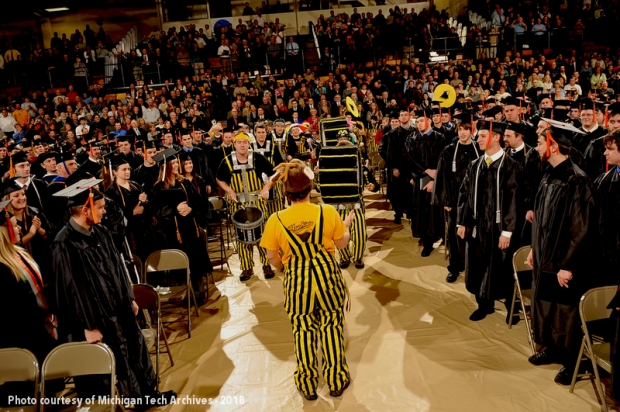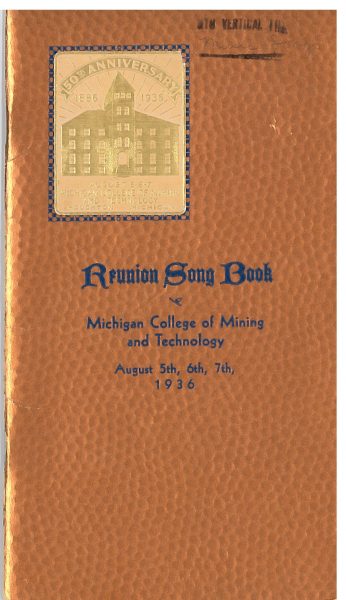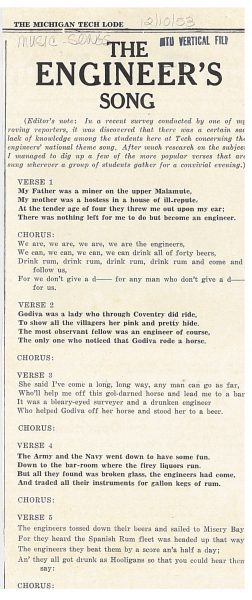Attend a Michigan Tech hockey game, as so many students and community members have loved to do over the years, and there’s no escaping the music. That’s not to say that anyone would desire such an escape: the rocking, rollicking Huskies Pep Band keeps the crowd entertained and excited about supporting the team. With catchy songs that are easy to learn and shout across the rink along with your closest friends, who could help but sing?
From the early days of Michigan Tech–when mining was the name of the game–students have delighted in raising their voices in song. Some of the first student songbooks now housed in the Michigan Tech Archives have a decidedly patriotic and scholarly bent. With the Great War raging overseas, for example, students picked up copies of “I Hear America Singing: Liberty Edition.” The booklet featured a medley of American tunes drawn from diverse sources: spirituals, folk music, hymns, and national anthems. “The Star-Spangled Banner” appeared alongside tunes from France and Russia, America’s allies. Such songbooks let Tech’s community gather together while also rallying around their country in a dark hour.
Of course, serious songs were hardly the only ones on the Husky program. For the 1936 Michigan College of Mining and Technology reunion, celebrating 50 years since the graduation of the first class of engineers, a commemorative songbook capturing favorites from the last five decades was produced. The very first piece began with the singers calling out to a waiter for “big beers” for the “MCMT engineers.” It was not the only drinking song to extol the college: another, noting that it shamelessly stole from a Yale melody, called for Michigan Tech grads to “drink her down, drink her down, drink her down,” because “she turns out mining men.” Yet a third piece, set to a tune titled “Under the Anheuser-Busch,” celebrated various faculty members as their former students “tip[ped] up a stein… clink, drink!”
Researching these songs, one gets the impression that Michigan Tech students have always been a little raucous.
By the 1950s, the music had grown even more boisterous in reflection of this. In 1953, the Michigan Tech Lode printed a statement bemoaning “a certain sad lack of knowledge among the students here at Tech concerning the engineers’ national theme song… sung whenever a group of students gather for a convivial evening.” To educate their naive peers, the Lode editors ran a selection of the lyrics:
“We are, we are, we are, we are the engineers
We can, we can, we can, we can drink all of forty beers…”
The chorus and verses recalling the lyricist’s rough beginnings as the child of a prostitute and a miner in Alaska remain staples of the Huskies Pep Band to this day.
The 1950s through the early 1970s established several other songs as vital entries of the campus repertoire. Graduates from 1952-1955 recalled these years as the introduction of the “Blue Skirt Waltz,” marked by linking arms and swaying with a neighbor. The “Waltz” was then a popular song played on the radio and on record players. It was, in fact, too popular. Wrote alumnus Bill Davison from the class of 1952, “A disk jockey at WHDF… kept playing the Blue Skirt Waltz over and over to the annoyance of many, apparently also the student body at Tech. I think they then parodied the song into a fight song that year and it stuck.” Bill Saul, a few years younger than Davison, credited the lyrics of the “Engineers” song for the inauguration of the “Blue Skirt Waltz.” At the time, “the Engineer’s Song was being sung at hockey games, very lustily and being accepted as quite lewd, racy or bawdy as it impacted the listener. This song had been introduced or slipped into the repertoire quietly and barely noticed at first but with each game it became louder and more pronounced until no one could ignore it. The students really enjoyed singing this out!”
So, Saul said, “the band was directed not to play the Engineer’s song at public events since it was offensive to some and reflected a negative image upon the school… without fanfare and supposedly spontaneously at one of the hockey games the band struck up the Blue Skirt Waltz.” Although some students resented the administration’s censorship, they nevertheless embraced the “Blue Skirt Waltz,” and it stuck for the next seventy years.
The waltz had come to American airwaves courtesy of polka musician Frankie Yankovic, and Yankovic also enjoys the distinction of bringing one of Michigan Tech’s other favorite songs to the United States. In 1956, “Die Fischerin vom Bodensee,” a film about the tumultuous romance of a fisherwoman, premiered in German cinemas. A rollicking polka provided the movie’s musical centerpiece: “Im Himmel Gibt’s Kein Bier.” Yankovic and Joe Trolli saw the opportunity to introduce the song to English-speaking audiences, who would no doubt passionately endorse its message. Pumping the accordion with passion, Yankovic belted out:
“In Heaven there is no beer!
That’s why we drink it here.
And when we’re gone from here,
All our friends will be drinking all our beer.”
As Michigan Tech Huskies can have a reputation as connoisseurs of beer, Yankovic’s song found in them affectionate enthusiasm. Although it took some time for “In Heaven There is No Beer” to be officially acknowledged as a university favorite, by 1978 unofficial songbooks distributed among the student body proudly featured the piece. Over the years, additional verses deriding Copper Country snowfall and casting aspersions on referees worked their way into the song, finding among the students equally ardent support. This song is unquestionably here to stay.
Indeed, the only question that remains is what Tech annoyance will next be lambasted in a new verse.



The HUSKIES PEP BAND is the most awesome band on planet earth. Keep up the great traditions!
Great fun I had at dem games! Bailey loves the wild enthusiasm and unabashed loyalty ya!